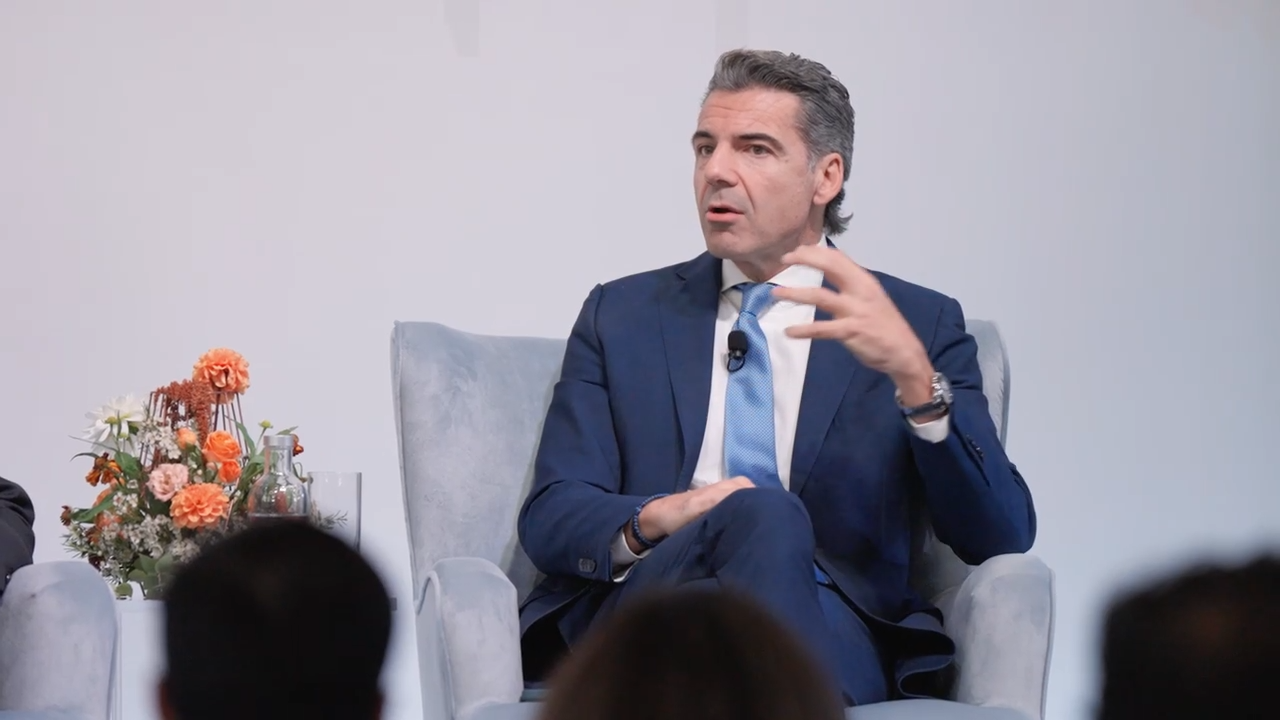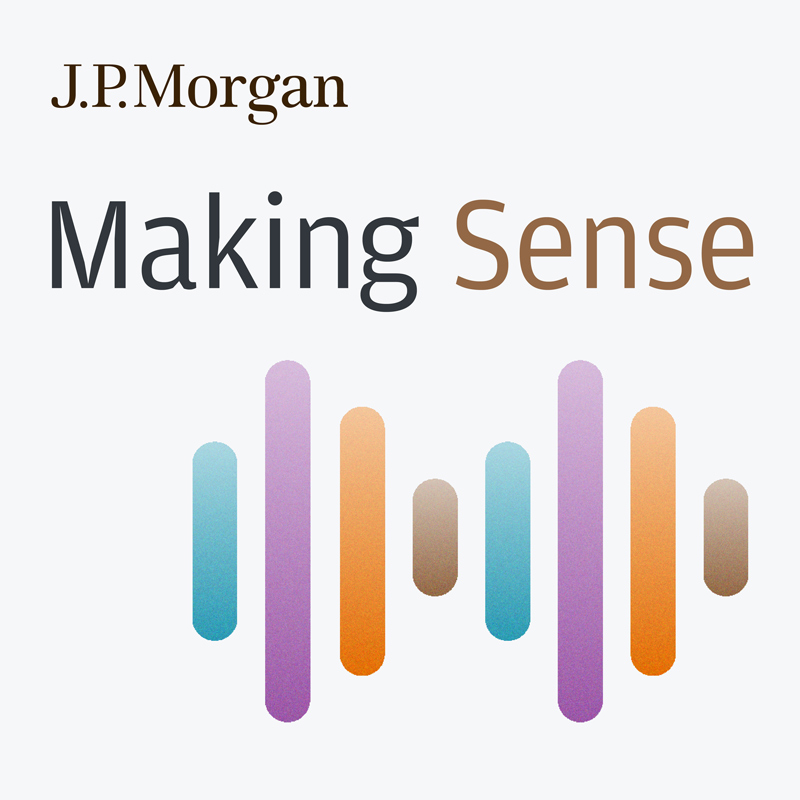From uncertainty to opportunity: The future of EMEA dealmaking
Louise Bennetts: Hello, you're listening to What's The Deal? on J.P. Morgan's Making Sense. I'm your host, Louise Bennetts, head of J.P. Morgan's board advisory team in EMEA. Today, we're discussing the European dealmaking outlook for 2025. And we're very pleased to be joined by Conor Hillary, the deputy CEO and head of Investment Banking for the EMEA region. Conor, thank you for joining us.
Conor Hillery: Thanks, Louise.
Louise Bennetts: So Conor, 2024 was a year of considerable geopolitical and economic uncertainty. We had multiple elections across the globe, ongoing and escalating conflicts, persistent inflation. And typically, this type of uncertainty and volatility in the market is not conducive to dealmaking. But yet, paradoxically, we saw a resumption of dealmaking. And it was, in fact, a much better year than 2023, particularly on the M&A side with high levels of activity overall. So Conor, what factors do you think drove this? And here we are in the second month of the year in 2025. Do you expect this trend to continue?
Conor Hillery: Yeah, we did indeed see a significant recovery in dealmaking in 2024. And the key driver behind that was improving confidence in the economy. So 18 months ago, inflation was near or at double digit rates in most major economies. Interest rates were continuing to rise, elevated far above levels at which they had been for many years before. And we had the spectre of U.S. recession and global recession. Then during the course of 2024, companies in the markets and the markets saw inflation moderate, saw interest rates coming down almost an inflection point. And with that, an improved economic outlook, which underpinned more confidence in corporate profitability. And crucially, we also saw a normalization of debt financing markets. So those things coming together really did spur on an increase in dealmaking into 2024. And as we go into 2025, we expect to see that momentum continue in dealmaking. We're seeing a healthy pipeline of activity in our business in the first quarter of the year, consistent with the improved economic outlook. There's an abundance of liquidity in debt and equity markets, both public and private markets, to support good deals. Now, good deals, the bar is still high, but the liquidity is undoubtedly there. And debt financing costs should come down a bit further. The other boon to dealmaking, I think, as we look ahead, is the expectation and hopefully the reality of a more favorable regulatory environment. So we're seeing that in the U.S., but also in the U.K. and Europe, which should support more sensible M&A transactions. So confidence is growing, risk appetite is increasing a notch further. And there are companies who want to get on with doing things that they deferred in very uncertain times, whether it's IPOs, M&A, capital raising and so forth.
Louise Bennetts: And in your view, what are companies worried about?
Conor Hillery: Yeah, look, I think there's still plenty of things to worry about. I've said some quite positive things there, Louise. There's still plenty of things to worry about. There are plenty of unknowns. And I think top of that list is inflation. I said it's coming down. The evidence is showing that, including the last number of weeks. But there's still an anxiety as to how sticky it might be from here. So that's one big variable. The impact of tariffs, unknown. The specificity, timing, direction of them. That is another major uncertainty. And then obviously, we've got global conflict running very high levels, well beyond what we've seen in many decades, which brings additional anxiety and uncertainty to the world, as well as the hardship it brings to so many people. So there are still quite a number of uncertainties out there, notwithstanding the tailwinds that we're expecting to see for dealmaking.
Louise Bennetts: So you see these geopolitical issues, and they're almost become like a new normal. What do you see as the main drivers of deal making regionally this year?
Conor Hillery: I think one thing we'll see more of is cross-border deals, especially given the strength of the U.S. dollar, pro-business, pro-growth agenda from the U.S. We're also seeing many U.S. companies trading at higher valuation levels than European counterparts. So between share prices going up, interest rates coming down, and a strong U.S. dollar, it's just got cheaper to acquire overseas if you're a big U.S. company. I think that is a trend we're likely to see. Private equity, I mentioned earlier. Private equity is likely to be a big driver of deal activity, as they sell assets more easily than they could have over the last couple of years and look to deploy. And We're seeing more private equity involvement in public company situations. We've seen that over the last year. And the level of private money available, it really is a whole new paradigm for the market compared to the historic reliance on stock markets and public markets. We're also expecting IPOs to be more prominent in 2025. The IPO market reopened last year. The majority of companies listed have traded well in the aftermarket in terms of share price performance. And equity investors still have high levels of liquidity to put to work for the right situations. So I think there are a number of factors that should drive transactions. Tariffs is the one, is a big question. Will that be an accelerant to M&A activity or will it be a deterrent? And it very much depends how they play out because they could well be a catalyst for M&A as a response or mitigant to the kind of commercial and strategic impact they could have on some companies who may see the need to diversify geographically or by business line and so forth. So there are a lot of things out there that could be a good underpin to this deal activity continuing to pick up during the course of this year, which is kind of very much what we're expecting.
Louise Bennetts: Yeah, so that's interesting. And I think last year, when we were going around the region and sort of having conversations with particularly board members in our case, one consistent theme amongst European board members was a nervousness around the perceived competitive advantage that their U.S. competitors would have over European players. Obviously, as you've said, that can also have a positive aspect, but there is a little bit of a sense that European corporates have been falling behind. And I know that you've had a long career as an industry banker and in your current role, you spend a lot of time speaking to these people. How are leadership teams and boards in the region feeling about the year ahead?
Conor Hillery: Boards have had to contend with really extreme levels of uncertainty for the last five years. You think about COVID, the various wars and conflict, multi-decade high levels of inflation, rising interest rates, and then a lot of political and electoral uncertainty. But there are two particular comments I would make. Firstly, notwithstanding the multitude of headwinds and uncertainties, many of the larger European companies have managed in a very resilient way over the last three or four years. Profitability has held up and balance sheets have remained robust and liquid. So that is a good foundation for better times ahead and for more confidence as we go into potentially a more stable economic environment. And the second thing I would say is, although there are some big uncertainties lingering out there, and uncertainty is the biggest deterrent to corporate activity and investment. There is now less uncertainty than we saw 12, 18 months ago. The global economy is growing, the economic outlook is less uncertain. And even if you look at all the electoral activity, there's still quite a bit to come. We've got Germany in a few weeks' time. But 8 out of 10 of the most populous countries in the world have had their elections in 2024, and the result is known. And we've seen the positive news of a ceasefire in the Middle East recently too. So there are reasons why boards may be more proactive and prepared to take a bit more risk because some of the fog is beginning to clear. But there are still big risks out there that cannot be denied.
Louise Bennetts: We've had quite a bit of interest from some of our large corporate clients in the region around discussions around relisting or re-domiciling in the U.S. or even setting up significant subsidiary operations. Now, some of that's driven by the tariff issues we discussed, by the Inflation Reduction Act, these kinds of pieces of legislation that sort of encourage onshore operations in the U.S.. But do you see this as a bit of a fad, or is it a beginning of a longer-term trend? As you say, there will be some interest in European corporates as well from the other side.
Conor Hillery: Yeah, we've seen quite a number of companies going to the U.S. to move their listing to the U.S. But it's not for every company. Companies that have gone there have done so because there are demonstrably higher valuation multiples in their sector, which is not always the case. And they've tended to be fairly large companies with significant U.S. operations. So I think it's quite case-specific rather than a general trend. And I would say we have a lot of company clients who want to list in Europe, including in London, over the next 12 to 24 months.
Louise Bennetts: So you mentioned the U.K. in particular. Let's do a little bit more of a deep dive there. The government has recently put in place a number of what they described as pro-growth measures, but the fiscal challenges remain. What steps do you think the U.K. should be taking to improve sentiment?
Conor Hillery: Yeah, look, there is undoubtedly some strain in the public finances here in the U.K. But I think the government has implemented a raft of measures, and there's more to come in the coming weeks, to encourage more investment and promote growth in the U.K. So you're seeing a reform of planning legislation. The Chancellor has talked about pension fund consolidation to stimulate more investment in the U.K. economy. We've had the implementation of reforms to make London a more attractive place to list public companies. And then there's a general shift in regulation to focus on growth as well as risk and safety. The other thing I would say about the U.K. is London will always be a major financial centre because of the depth and pool of expertise, specialist expertise, the very stable, well-established and trusted rule of law. And, you know, the time zone, the history, the attractiveness as a place to live. So there are undoubtedly some challenges, but the medium term prospects are strong.
Louise Bennetts: We recently released our Corporate Compass report, and in an episode on this channel a few weeks back, Rama Variankaval discussed how U.S. markets have historically rewarded growth more than other developed markets. In Europe, we see equity investors ascribe a premium of 20 to 30% for scale. Is it fair to say that the U.S. markets reward high growth potential and European ones longevity and scale, or is that too simplistic a picture?
Conor Hillery: I think it probably is a bit simplistic. There are some trends, but look, the data firstly shows investors do ascribe a higher valuation to U.S. companies. If you look at the S&P, it's trading at the moment around 22 times forward earnings. The S&P 500, the FTSE 100 here in the U.K. about 11 times and the stocks 60, the European index about 13 times. So there really is a differential almost running at double the level. But you have to remember there are more high growth companies in the U.S. So colleagues here have looked at some of that data. The aggregate level of growth expected to be delivered by companies in the S&P 500 is two times higher than you're seeing in the Stock 600. So a lot of that is tech companies, companies that are being driven by the AI revolution and so forth. But it is a fact. But we've also looked at the data more deeply. There is some evidence that in the U.S. markets, there is a slightly bigger valuation premium paid for growth. So I think, look, for some companies that does present an opportunity, particularly companies set a moment ago with significant U.S. exposure. But it's not for every company. I think you have to look at it on a very case specific basis.
Louise Bennetts: And we discussed at the beginning, you know, the picture you painted around the potential for 2025 deal making was quite rosy across the region. One observation I've sort of had in my role is that European boards historically do tend to be quite risk averse when it comes to assessing transactions. And we've seen transaction based risk increase from a number of angles. You know, you have activism, you have antitrust authorities, and timelines have been extended on some of the assessments for deals to close, debates over valuations.
Louise Bennetts: So Conor, final question for today, how can boards best prepare for and manage these risks so they're able to take advantage of this environment?
Conor Hillery: No, look, I think the last five years in particular have reinforced how uncertain the world can be. Economically, socially, politically, climate, pandemic, and so forth. And what we're seeing boards doing more of is planning for a range of scenarios. There isn't really kind of a confident base case anymore. A range of scenarios around, you know, economic outlook, interest rates, maybe they'll be higher for longer, tariffs, trade, regulation, climate, the extent that impacts your business, impacts nearly every business, your prospective funding and capital needs, AI, you know, threat or opportunity. The list goes on and on. But more introspection and challenge as to where the kind of really big risks out there. What are the scenarios that could be significantly adverse from our base case? And what does it mean for our business, for our strategy, for our balance sheet, for our profitability, for our competitive position? And clearly you can't legislate for every outcome, but we're just seeing more companies thinking ahead and being better prepared. And a lot of companies actually came into the challenges we've faced over the last couple of years, the economic challenges, well prepared. You know, during the height of COVID, hundreds of companies went out to the market. They raised liquidity preemptively. They raised capital preemptively. In case it was needed for very challenging times. And that stood them in very good stead. So I think that that's what we're seeing more of. Not necessarily conservatism, but really challenging themselves as to what's the rainy day scenario here. And then more positively, how can we put ourselves in a position of strength when the opportunity arises to invest, to grow, to do acquisitions and so forth. So that you are well prepared when the moment comes.
Louise Bennetts: Thank you, Conor. So I think to summarize the takeaway here, we can see that the European environment may remain challenging, but it does provid a lot of opportunity for increased consolidation, for deal making. And so we look forward to a busy 2025. Thank you very much for your time.
Conor Hillery: That sounds like a great summary Thank you very much, Louise.
Voiceover: Thanks for listening to What’s The Deal? If you’ve enjoyed this conversation, we hope you’ll review, rate, and subscribe to J.P. Morgan’s Making Sense to stay on top of the latest industry news and trends – available on Apple Podcasts, Spotify, and YouTube. This material was prepared by the investment banking group of J.P. Morgan Securities LLC and not the firm's research department. It is for informational purposed only, and is not intended as an offer or solicitation for the purchase, sale, or tender of any financial instrument. © 2025 JPMorgan Chase & Company. All rights reserved.
[End of episode]





